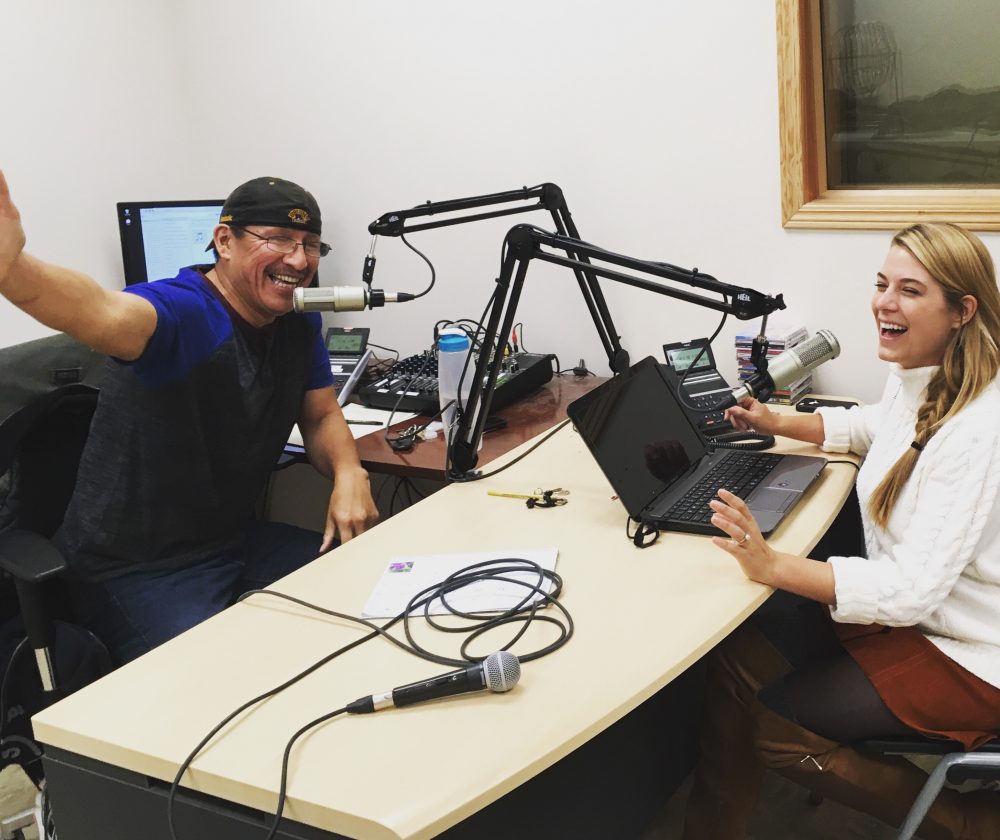Fort Hope Farm began as a vision shared between Eabametoong First Nation Elders. This vision sowed a seed that was supported and brought to life by a team of people; the shared values and community voices nurtured the farm into success. Since 2015, Fort Hope Farm has grown from a small community garden to a 12-acre farm and social enterprise, soon to incorporate commercial greenhouse production. Katrin supported the Working Group in procuring funding, honing the vision and facilitating the farm’s development. Fort Hope Farm generated:
- Job creation
- Economic development
- Increased food security
- Cultural reclemation
- The positioning of EFN as future leaders of food production in the North
Fort Hope Farm went on to be provincially recognized through their achievement of the Rural Ontario Leadership Award from the Ontario Ministry of Agriculture, Food and Rural Affairs (OMAFRA).
CBC NEWS – Eabametoong Farm Wins Provincial Award
Community
Eabametoong First Nation
Year
2015 – 2019
Deliverables
- Project development
- Capacity building
- Community planning
- Economic development
- Proposal writing and training
- Monitoring, evaluation & reporting
Fort Hope Farm wins Rural Ontario Leaders Award
Celebrating their OMAFRA award for Fort Hope Farm’s work in combating food insecurity by blending Traditional Knowledge and innovation. With EFN Councillor, Louie Sugarhead, and Farm Manager, Rudy Waboose.
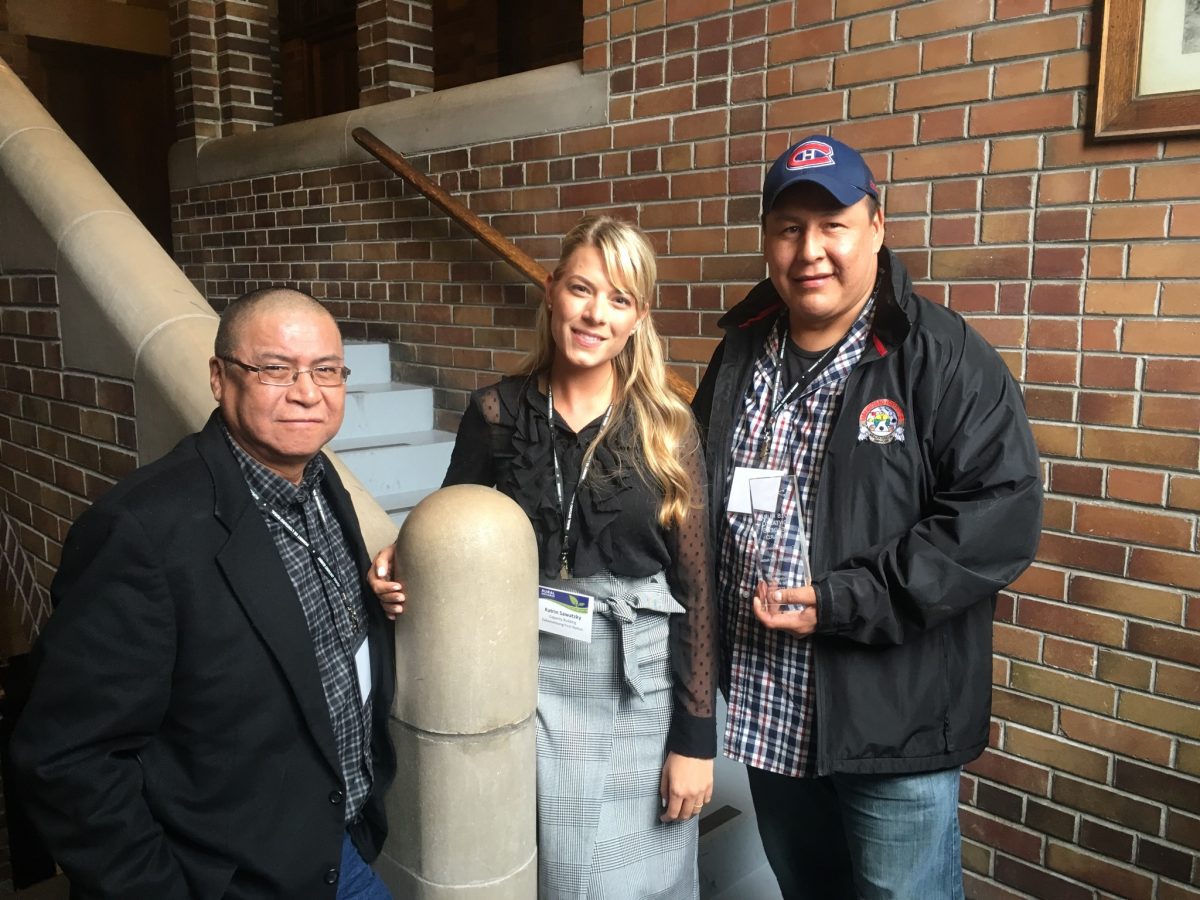
Fort Hope Farm team and volunteers
Team picture, harvesting farm produce. From left to right: Fred Meeseetawageesic, Curan Atlookan, Rudy Waboose, Ryan Oshganeegash, Brent Kukkee, Marlene Atlookan and Fred Meeseetawageesic.
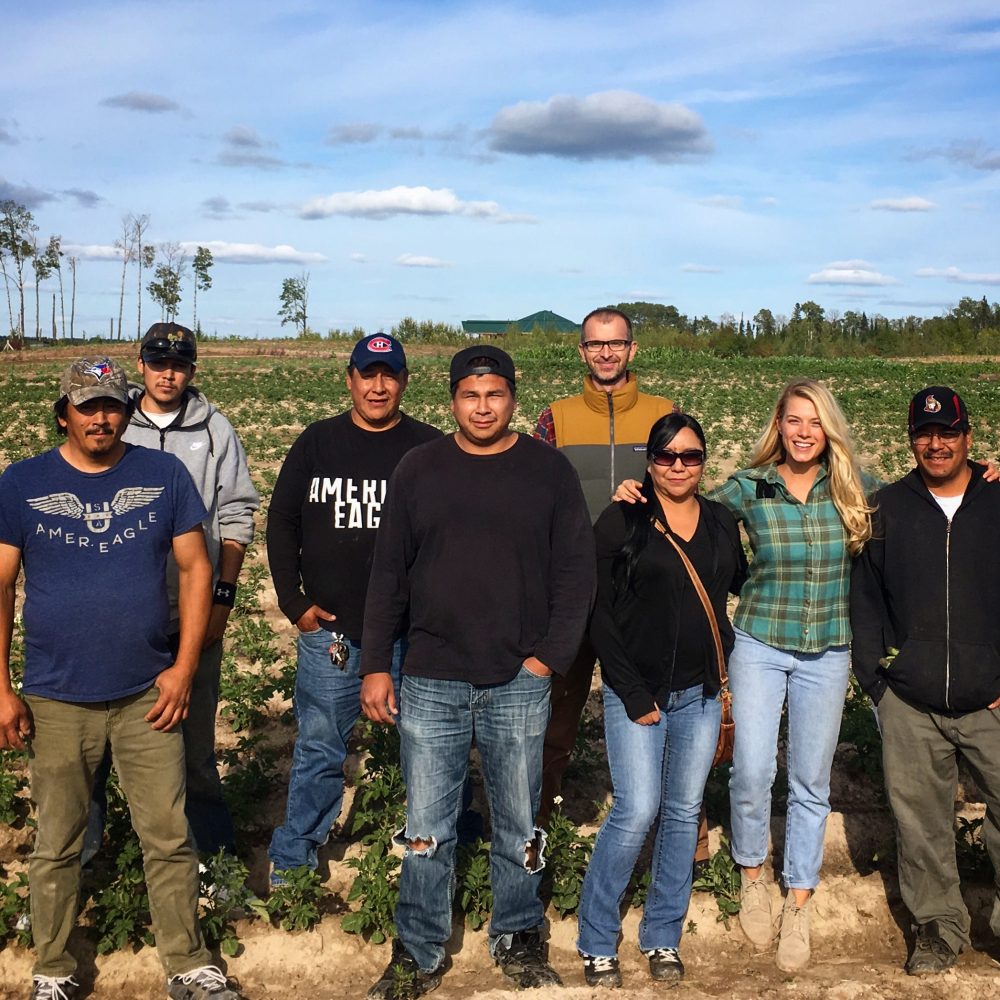
Eabametoong First Nation’s Healing Lodge
By mobilizing knowledge gained from local studies, EFN created many well-being initiatives, including the Healing Lodge Restoration Project. Through a process of community visioning, strategic partnership development and procuring funding, Eabametoong has restored the Healing Lodge so that it can serve as a space to facilitate community well-being. This project:
- Created local jobs for contractors and woodworkers
- Served as a skills-training initiative for local Youth
- Housed community celebrations like the annual Harvest Festival, Land Blessing events and the Back-to-the-Land program
Community
Eabametoong First Nation
Year
2016 – 2017
Deliverables
- Project development
- Capacity building
- Community planning
- Economic development
- Proposal writing and training
EABAMETOONG HEALING LODGE RESTORATION PROJECT
Pictured here is the project team staining the exterior of the building.

Eabametoong First Nation’s Restorative Justice Program
Through a process of community planning and partnership development, EFN received funding to develop a Restorative Justice Program – a system of criminal justice which focuses on the rehabilitation of offenders through reconciliation with victims and the community at large. This program has run for over eight years (engaging over 100 Youth), with on a prevention focus on supporting at-risk Youth and their families through reconnecting them back to the Land, connecting with their Elders and participating in Healing Circles. This project:
- Helped to support at-risk Youth through participation in Circles and providing skills training
- Preserved the Ojibway culture and wisdom of the Elders through its ‘Land-Based Healing’ program
- Created local jobs for restorative justice frontline workers and training opportunities
- Developed a locally-run Justice Group and accompanying Terms of Reference
Community
Eabametoong First Nation
Year
2016 – 2025
Deliverables
- Program development
- Capacity building
- Community planning
- Partnership development
- Monitoring, evaluation & reporting
EABAMETOONG YOUTH KNOWLEDGE
Eabametoong Youth sharing knowledge on the traditional process of cleaning, battering and frying fresh local pickerel. They were generous in sharing stories of personal resilience and hopes for their future and community. From left to right: Alexandra Missewace, Erin Atlookan and Walker Atlookan.
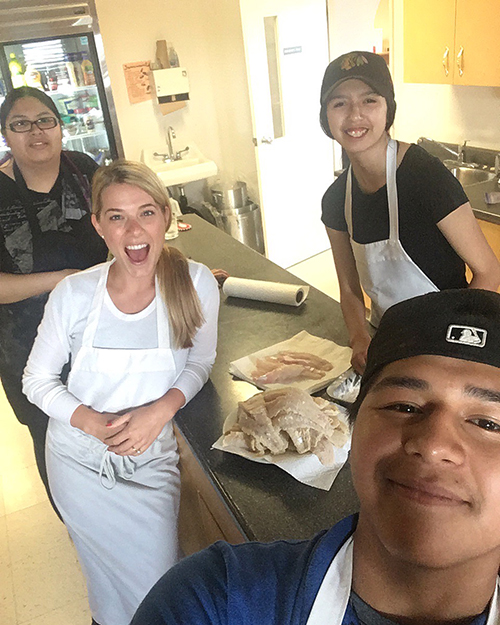
Proposal Writing & Project Planning Workshops
Katrin facilitates proposal writing & project planning workshops to a variety of audiences. These training sessions focus on building capacity in order to:
- Locate project-appropriate funding
- Network & develop strategic partnerships
- Manage time
- Develop Work Plans
- Develop Monitoring & Evaluation Plans
- Develop Project Sustainability Plans
- Develop Project Budgets
- Use technical field-specific language
- Write, edit & develop funding proposals
Proposal Writing and Project Planning with Eabametoong First Nation
Pictured here is an inter-disciplinary team from EFN after a training session. These workshops and training sessions have been delivered to: Eabametoong First Nation, Ginoogmaing First Nation, Garden River First Nation, Wabasemoong First Nation, Six Nations of the Grand River, Constance Lake First Nation, as well as at conferences and for local Not-For-Profit organizations.
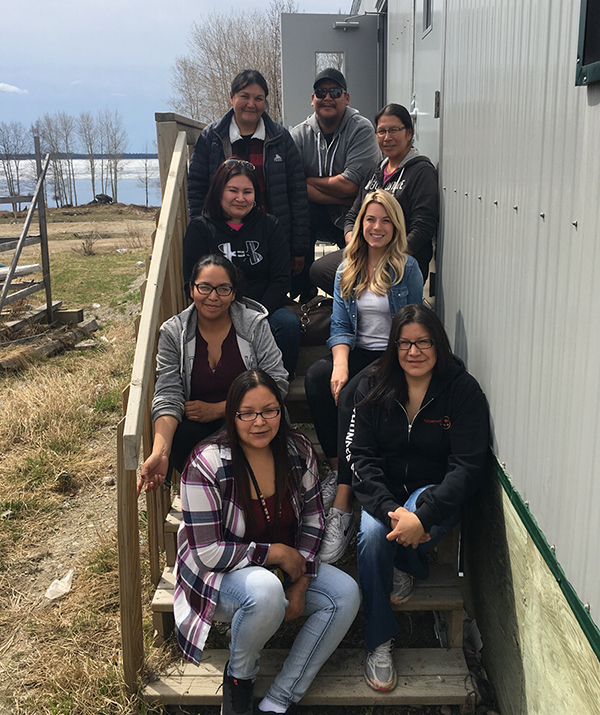
National First Nation Housing Conference 2017
Katrin led a proposal writing workshop and training session at the National First Nation Housing Conference on behalf of Canada Mortgage and Housing Corporation (CMHC), building capacity among First Nation housing officials to develop projects and procure funding.
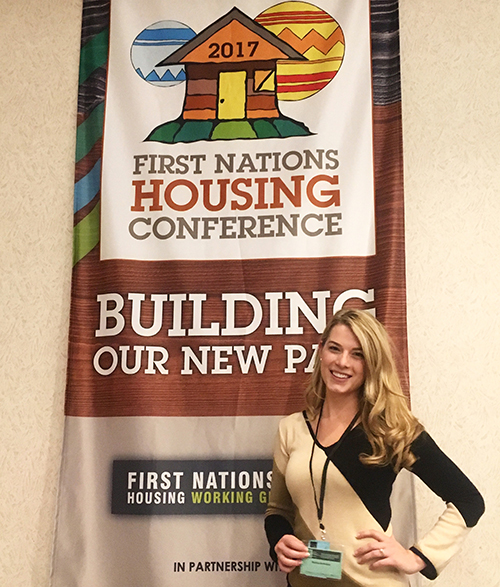
Garden River First Nation Housing Policy
Housing Policy
Katrin partnered with Garden River’s Housing Department and leadership to develop the Garden River First Nation Housing Policy and Procedures. The policy has become a valuable tool to:
- Enhance the delivery of housing programs and services on Garden River land
- Close gaps and remove barriers in accessing affordable housing
- Uphold the existing local governance framework
Building Guide
Katrin also collaborated with the Housing Department to create a Homeowner’s Building Guide – a tool for homeowners who wish to build their home privately on-reserve. By engaging in stakeholder consultation, community-based research and content development, the Guide:
- Provides practical information that supports homeowners as they embark on their home-building journeys
- Encourages the construction of safer and more energy-efficient homes
- Supports equitable building processes
- Results in a higher level of satisfaction and empowerment for the homeowner
Community
Garden River First Nation
Year
2016 – 2021
Deliverables
- Creation of Housing Policy
- Independent audit of housing case files
- Stakeholder consultation
- Building Guide research, development, design & publication
Garden River First Nation Housing Department
Team visioning session, captured in February, 2017. From left to right: Richard Perrault, Anne Headrick, Charlotte Boissoneau, Greg Solomon and Carrie Zeppa.
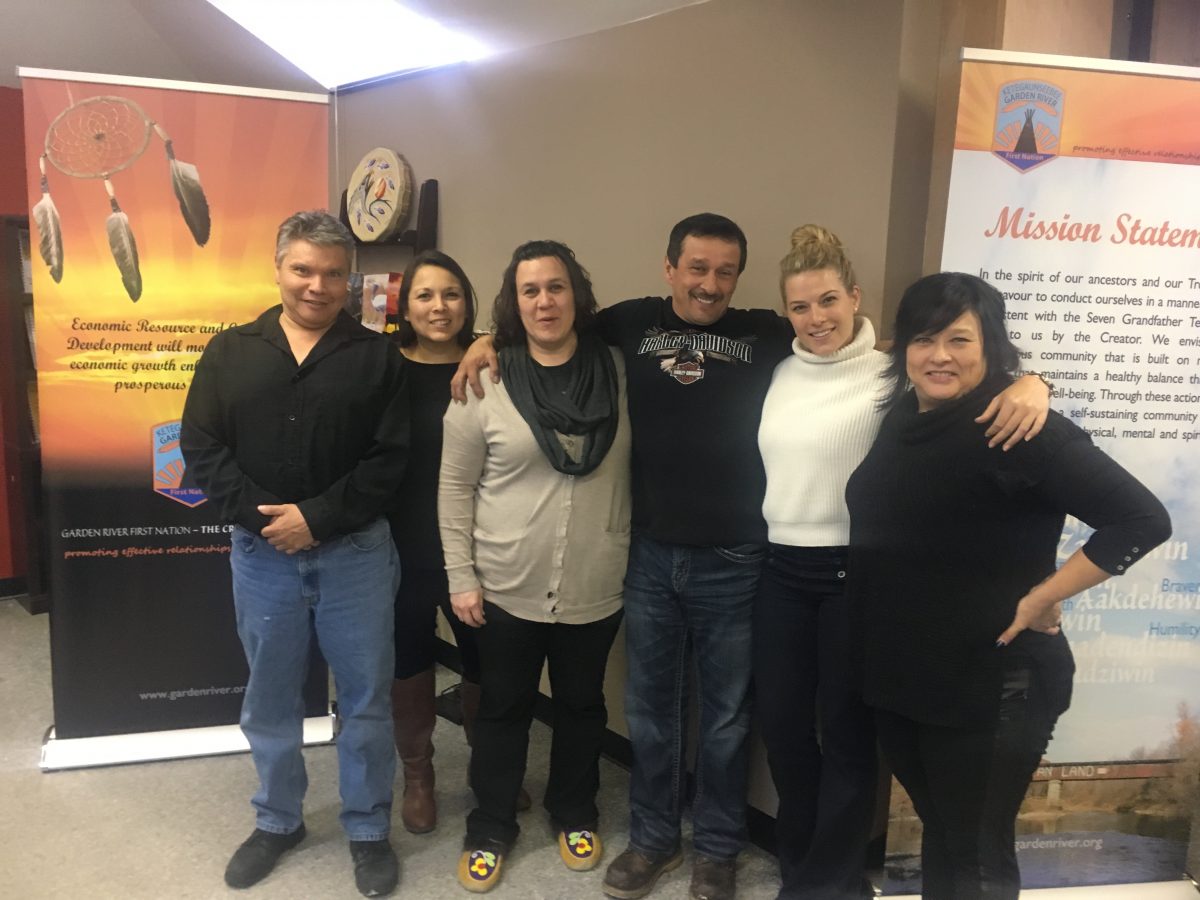
Building Lasting Partnerships – Anne Headrick, Garden River First Nation Housing Supervisor
Garden River First Nation is cultivating an innovative and local approach to housing to ensure that all community members have access to safe, affordable and environmentally-friendly homes. Together with our many community stakeholders, we’re designing Ontario’s primary First Nations Homeowner’s Building Guide, a tool that supports Indigenous homeowners in advocating their needs and promoting a more equitable experience during their build.

Garden River
The iconic message of pride and protest displayed on Garden River First Nation’s railroad bridge.
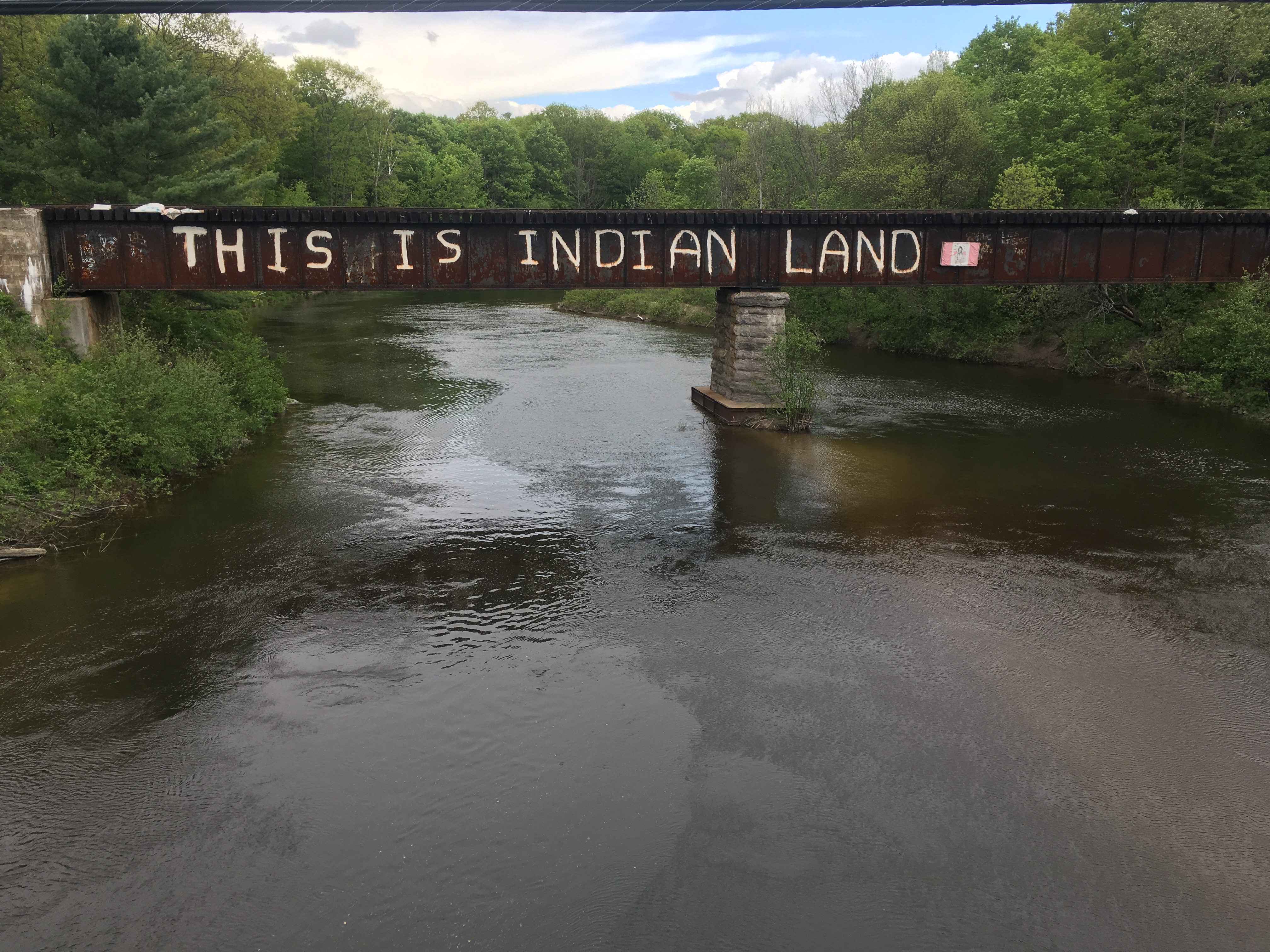
Advocacy
Katrin is deeply passionate about social and environmental justice, food sovereignty and Indigenous-settler relations. When not practicing in the field, Katrin enjoys teaching, speaking and writing about these issues.
Teaching
- Working with students to use the Indigenous method of ‘Circle’ as a facilitation tool for community planning, social justice and engagement
- Exploring case studies on capacity building to promote cross-cultural relationships & reconciliation
Guest lecturer & facilitator for International Development Studies (undergraduate level IDEV4500) – University of Guelph, College of Social and Applied Human Sciences
Guest lecturer in Advanced Rural Planning (graduate level) – University of Guelph, School of Environmental Design & Rural Development (SEDRD)
Guest lecturer for ‘Challenge and Change in Society’ (high school course) at the Blyth Institute in Waterloo, Ontario
Speaking
- Presenter at the Indigenous Housing Solutions Virtual Conference: Promoting Equitable Indigenous Homeownership On-Reserve [case study] (2021)
- Facilitator at the Nishnawbe-Aski Nation Restorative Justice Symposium with Eabametoong First Nation & Deputy Chief Derek Fox: Exploring Community-Led Diversion Programs & Opportunities for Indigenous Justice Reform (2020)
- Circle Workshop Facilitator for the Global Climate Strike, sponsored by the Guelph Wellington Climate Coalition (2019)
- Speaker at the Six Nations Farmers Association, Six Nations of the Grand River: Farming in Ontario’s Far North, Opportunities & Challenges (2018)
- Presenter at Sioux Lookout First Nation Health Authority conference on Food Sovereignty: Taking Back Our Food Chain (2018)
- Speaker & Workshop Facilitator at the National First Nation Housing Conference (2017)
- Circle Workshop Facilitator for the Inner Transition Group, Sustainability Week: Healing Ourselves, Healing Our Planet (2016)
Publications
- Sawatzky, K. (2015). Living Transition: Stories of Resilience (A Heuristic Study). ResearchGate.
- Khan, B., Sawatzky, K., Lauzon, A. (2015). The pedagogy of a found poem: Making the implicit explicit. ResearchGate.
Projects & Additional Resources
The Friendship Feather
Eabametoong First Nation’s Health Director, Robert Baxter, presented Katrin with an eagle’s feather (The Friendship Feather) representing reconciliation. This humbling and generous gesture represents trust between two friends.
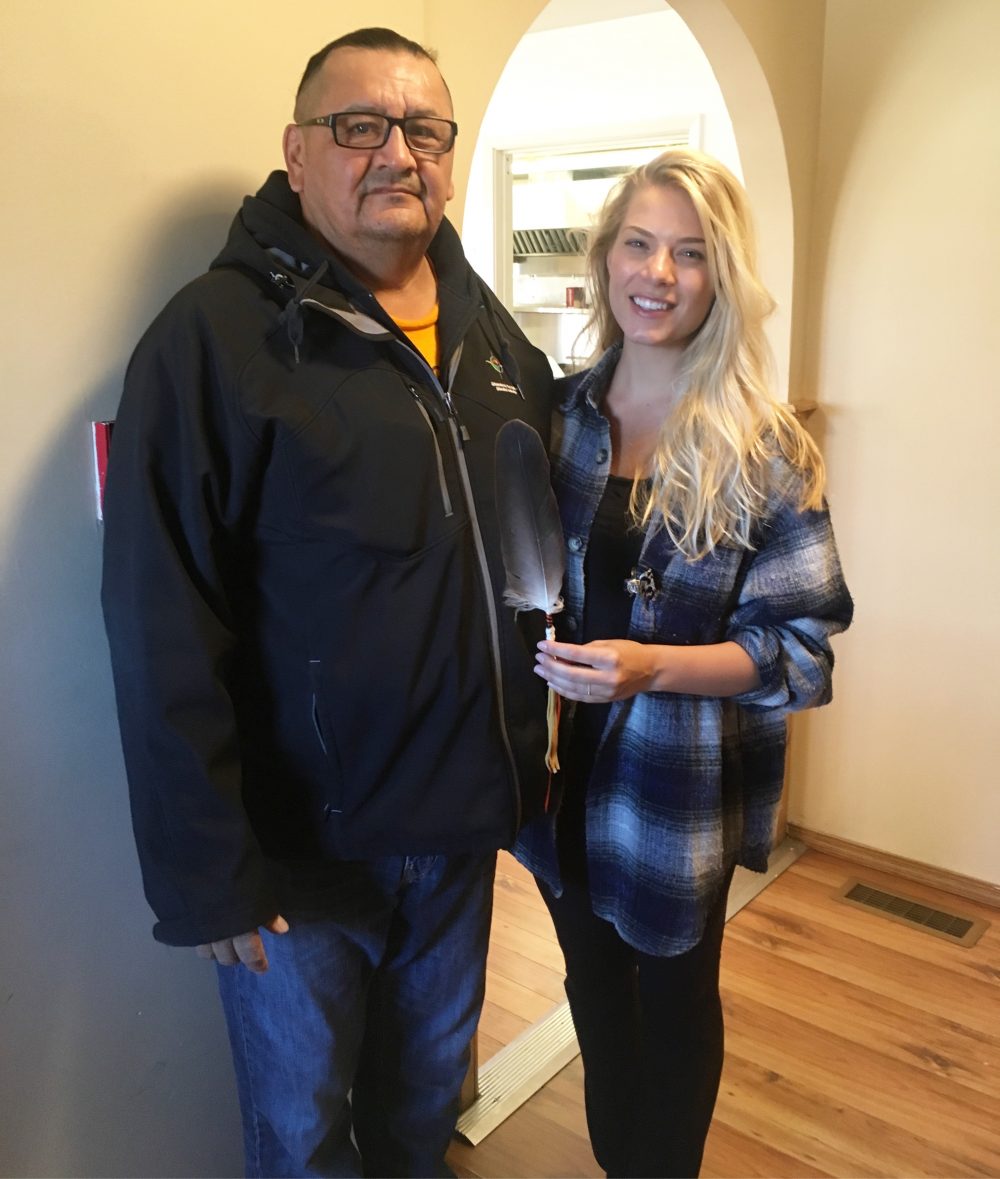
Guest Lecturer – School of Environmental Design & Rural Development, University of Guelph
Facilitating ‘Circle’ with graduate students in Advanced Planning at the University of Guelph.
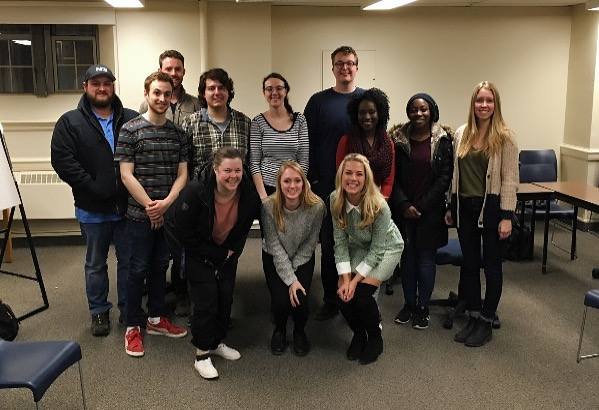
On the Air
Radio host, Sid Okeese, invites Katrin to speak on local Eabametoong radio about Fort Hope Farm, starting tomatoes from seed, their mutual adoration of the Tragically Hip and how strange of a word Guelph is.
